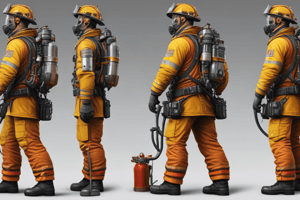Podcast
Questions and Answers
What is the SI unit of pressure?
What is the SI unit of pressure?
- Henry
- Pascal (correct)
- Joule
- Hertz
Which unit of measurement is incorrectly matched with its physical quantity?
Which unit of measurement is incorrectly matched with its physical quantity?
- Henry - Pressure (correct)
- Pascal - Pressure
- Hertz - Frequency
- Joule - Energy
If pressure is measured in Pascals, which of the following is a correct unit for energy?
If pressure is measured in Pascals, which of the following is a correct unit for energy?
- Hertz
- Joule (correct)
- Pascal
- Henry
In which of the following contexts is the Pascal commonly used?
In which of the following contexts is the Pascal commonly used?
Which of the following pairs consists of SI units for different physical quantities?
Which of the following pairs consists of SI units for different physical quantities?
Flashcards are hidden until you start studying
Study Notes
SI Unit of Pressure
- The SI unit of pressure is the Pascal (Pa).
- One Pascal is defined as one newton per square meter (N/m²).
Incorrectly Matched Units
- Common examples include mixing up units like joules (energy) with newtons (force).
Energy Measurement Units
- In the context of pressure being measured in Pascals, the correct unit for energy is the Joule (J).
- Joules can be expressed in various ways, such as (1 , \text{J} = 1 , \text{N} \cdot \text{m}).
Contexts for Pascal Usage
- The Pascal is commonly used in contexts like meteorology for measuring atmospheric pressure.
- It is also relevant in engineering, hydraulics, and material science when discussing stress and pressure.
SI Unit Pairs for Different Physical Quantities
- Examples of SI unit pairs consist of mismatch instances like kilograms for mass and meters per second squared for acceleration.
- Different physical quantities correspond to unique SI units, ensuring clarity in measurements and calculations.
Studying That Suits You
Use AI to generate personalized quizzes and flashcards to suit your learning preferences.




